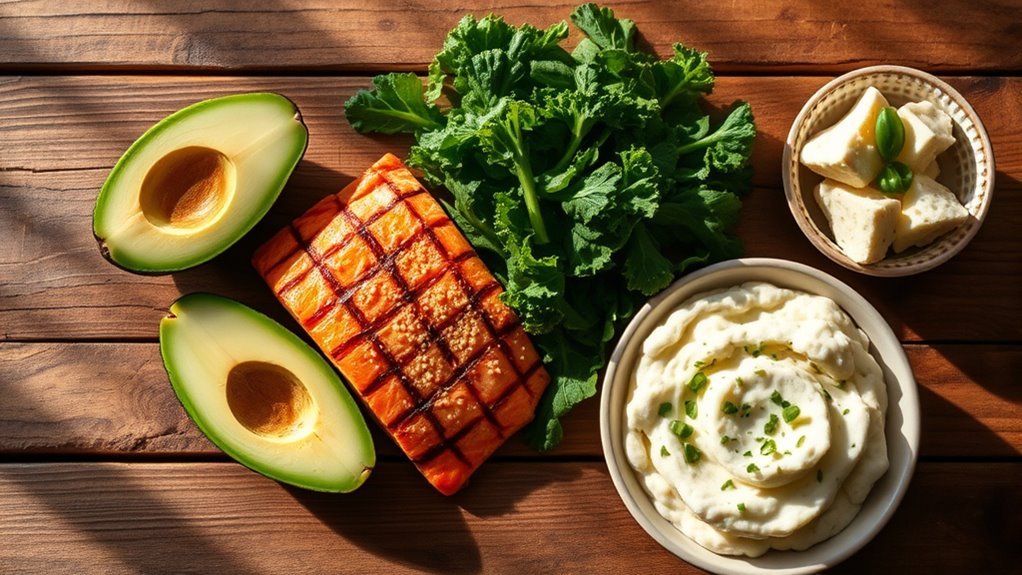The ketogenic diet can be effective for weight loss as it shifts your body into ketosis, where it burns fat for energy instead of carbs. Many people experience rapid initial weight loss due to this fat-burning state. However, results can vary based on individual metabolism and lifestyle factors. While there are benefits, such as improved appetite control, there can also be potential drawbacks like nutrient deficiencies. There’s much more to understand about making keto work for you.
Understanding the Ketogenic Diet

When you immerse yourself in the ketogenic diet, you’ll find it’s more than just a trendy eating plan; it’s a significant shift in how your body processes energy. Many people cling to keto misconceptions, believing it’s all about extreme dietary restrictions. In reality, it’s about finding a balance that works for you. By drastically reducing carbohydrates and increasing healthy fats, your body enters a state of ketosis, where it efficiently burns fat for fuel. This doesn’t mean you have to forgo all your favorite foods; instead, you can explore delicious alternatives. With a personalized approach, you can embrace the freedom to enjoy a variety of meals while still achieving your weight loss goals. Remember, understanding keto is key to making it work for you.
The Science Behind Ketosis

While many people are drawn to the ketogenic diet for its promise of weight loss, understanding the science behind ketosis is essential for achieving lasting results. Ketosis is a metabolic state where your body shifts from using carbohydrates as its primary fuel source to burning fat for energy. This change, known as fat adaptation, involves the production of ketones, which serve as an alternative energy source. As you adapt to this state, your energy production becomes more efficient, helping to stabilize blood sugar levels and reduce hunger. Embracing this knowledge empowers you to make informed choices, fostering a sense of freedom in your dietary journey while aiming for sustainable weight loss. Understanding ketosis equips you to navigate your path with confidence.
How Keto Affects Weight Loss

Understanding ketosis is just the beginning; now, let’s explore how this metabolic state directly impacts weight loss. Many people fall for keto misconceptions, believing it’s just another fad diet. In reality, the keto diet shifts your body into fat-burning mode, which can lead to significant weight loss. However, it’s essential to debunk some keto myths. Not everyone will experience the same results, as individual metabolism and lifestyle play vital roles. You might find that initial weight loss is quick, but sustaining it requires a balanced approach. Emphasizing whole, nutrient-dense foods while staying mindful of your body’s needs can help you achieve lasting results. Remember, it’s about finding what works best for you, not just following trends.
Benefits of the Keto Diet
When you switch to a keto diet, you might experience rapid fat loss, which can be motivating and rewarding. You’ll also likely notice better appetite control, helping you stick to your goals with less struggle. Many people report improved energy levels, making it easier to stay active throughout the day.
Rapid Fat Loss
The keto diet can be a powerful tool for rapid fat loss, especially if you’re looking to shed pounds quickly and effectively. By considerably reducing carbohydrate intake, your body enters a state of ketosis, where it burns fat for fuel instead of glucose. This shift can lead to rapid weight loss as your body adapts to using stored fat. When you’re in fat adaptation, your energy levels may stabilize, helping you maintain momentum in your weight loss journey. Many people report quick results, which can be motivating. However, it’s crucial to approach this diet mindfully and prioritize nutrient-dense foods. With the right balance, the keto diet can offer a liberating path to achieving your weight loss goals.
Appetite Control
As you experience rapid fat loss on the keto diet, you might notice an unexpected benefit: improved appetite control. This can be attributed to the way the diet affects hunger hormones and psychological factors. Here are some key points to contemplate:
- Reduced Ghrelin Levels: Keto can lower ghrelin, the hormone that signals hunger, making you feel less hungry.
- Increased Ketones: Elevated ketone levels can suppress appetite, keeping cravings at bay.
- Stable Blood Sugar: The diet helps maintain steady blood sugar levels, reducing mood swings and emotional eating.
- Mindful Eating: The focus on nutrient-dense foods encourages you to make conscious choices, promoting a healthier relationship with food.
These factors together empower you to take charge of your eating habits, giving you the freedom to enjoy food without constant cravings.
Improved Energy Levels
While many people initially turn to the keto diet for weight loss, one of the most rewarding side effects you might experience is a significant boost in energy levels. By shifting your body’s primary fuel source from carbohydrates to fats, you tap into a more efficient energy system. This change can lead to what’s often referred to as “keto energy,” providing you with sustained power throughout the day. Many find they enjoy enhanced stamina during workouts and daily activities, which can empower you to pursue your passions more freely. Research supports that once your body adapts to ketosis, you’ll likely notice improved focus and reduced fatigue. Embracing this lifestyle could reveal a new level of liveliness for you.
Potential Drawbacks of the Keto Diet
Although the keto diet can lead to significant weight loss for many, it’s important to contemplate the potential drawbacks that may accompany such a restrictive eating plan. Here are a few key concerns:
- Nutrient Deficiencies: You might miss essential vitamins and minerals by cutting out various food groups.
- Digestive Issues: High-fat diets can lead to constipation and other gastrointestinal discomforts.
- Compliance Challenges: Maintaining such a strict diet can be tough, especially during social situations where food options are limited.
- Mental Health: The rigidity of keto may lead to feelings of deprivation, potentially impacting your mood and overall mental well-being.
It’s vital to weigh these factors against the benefits before diving into the keto lifestyle.
Who Should Consider Keto?
For those considering the keto diet, it’s important to assess whether it aligns with your personal health goals and lifestyle. Keto may be a good fit if you’re looking to lose weight quickly, especially if you struggle with cravings or high-carb diets. However, you should evaluate your individual health conditions, such as diabetes or metabolic syndrome, as keto can benefit those with insulin resistance. Lifestyle factors, including your activity level and dietary preferences, also play a significant role. If you enjoy cooking and can commit to meal planning, keto might offer you the structure you desire. Ultimately, your decision should be informed by a balance of your health needs and the freedom to choose what feels right for you.
Tips for Starting a Keto Diet
Starting a keto diet can feel overwhelming, but focusing on a few key aspects can make it easier. You’ll want to understand macronutrient ratios, plan your meals effectively, and stay hydrated while managing your electrolytes. These foundational steps will help set you up for success on your weight loss journey.
Understand Macronutrient Ratios
Understanding macronutrient ratios is essential when starting a keto diet, as these ratios will largely determine your success in achieving weight loss goals. A proper macronutrient breakdown helps your body enter ketosis, where it burns fat for fuel instead of carbs. Here are the ideal ratios to aim for:
- Fats: 70-75% of your daily intake
- Proteins: 20-25% of your daily intake
- Carbohydrates: 5-10% of your daily intake
- Fiber: Include non-digestible carbs to support digestion
Meal Planning Essentials
When you commence a keto diet, effective meal planning is crucial for staying on track and achieving your weight loss goals. Start by creating a detailed shopping list that focuses on low-carb, high-fat foods like avocados, nuts, and leafy greens. This not only simplifies your shopping experience but also helps you avoid impulse buys. Incorporate meal prep into your routine to save time and guarantee you’ve got keto-friendly meals ready when hunger strikes. Batch-cook proteins and veggies, and consider using containers to portion out individual meals. This way, you’ll have tasty, compliant options at your fingertips. Remember, successful meal planning can empower you, giving you the freedom to enjoy your food while reaching your health objectives.
Hydration and Electrolytes
Hydration and electrolyte balance are often overlooked but essential components of a successful keto diet. As you begin this journey, keeping your body properly hydrated and your electrolytes in check can make a world of difference. Here are some hydration tips to help you thrive:
- Drink plenty of water: Aim for at least 8-10 cups daily to stay well-hydrated.
- Include electrolyte-rich foods: Incorporate avocados, leafy greens, and nuts for natural sources of potassium and magnesium.
- Consider supplements: If needed, a quality electrolyte supplement can help maintain balance, especially during the initial adjustment phase.
- Monitor your symptoms: Watch for signs of dehydration or imbalances, like fatigue or cramps, and adjust your intake accordingly.
With these strategies, you’ll be well on your way to a successful keto experience.
Comparing Keto to Other Diets
Although many diets promise quick weight loss, the ketogenic diet stands out due to its unique approach of drastically reducing carbohydrate intake while increasing fat consumption. When comparing keto to other diets like paleo, you’ll notice that paleo allows more carbs and focuses on whole foods, which may not lead to the same rapid results. If you’re considering a plant-based option, vegan keto can be a challenge due to limited fat sources, but it can still promote weight loss if done correctly. Each diet has its benefits, and effectiveness can vary based on individual preferences and lifestyles. Ultimately, the best choice is one that aligns with your goals, supports your freedom of choice, and feels sustainable for you in the long run.
Long-Term Sustainability of the Keto Diet
While many people find success with the keto diet in the short term, its long-term sustainability can be a concern for some. Here are a few challenges to evaluate:
- Sustainability challenges: Sticking to a strict keto regimen can be tough over time.
- Lifestyle compatibility: The diet may not fit well with your social situations or family meals.
- Potential nutrient deficiencies: Limiting food variety could lead to missing out on essential nutrients.
- Psychological impacts: Constantly monitoring carbs can affect your mental well-being and dietary flexibility.
Ultimately, if you’re weighing keto for the long haul, think about how it aligns with your lifestyle and personal goals. Balance is key to achieving and maintaining a healthy relationship with food.
Frequently Asked Questions about Keto and Weight Loss
1. What is the ketogenic diet and how does it promote weight loss?
The ketogenic diet is a high-fat, low-carbohydrate meal plan that aims to shift the body’s metabolism from burning carbohydrates for energy to burning fats. By drastically reducing carbohydrate intake and replacing it with fat, the body enters a metabolic state known as ketosis. In ketosis, fat is converted into ketones, which serve as an alternative energy source. This shift can lead to decreased appetite and increased fat burning, which can result in weight loss.
2. Are there any risks associated with the ketogenic diet?
While many people experience weight loss and health benefits on the ketogenic diet, there are potential risks. These can include nutrient deficiencies due to the restricted food choices, the “keto flu” (a group of symptoms like fatigue and irritability that some may experience when starting the diet), and long-term effects on heart health due to high saturated fat intake. It’s essential to consult with a healthcare provider before starting any new diet, especially one as restrictive as keto.
3. How quickly can I expect to lose weight on a ketogenic diet?
Weight loss on a ketogenic diet can vary greatly from person to person. Many people report rapid initial weight loss, primarily due to water weight loss as glycogen stores are depleted. This can range from 2 to 10 pounds in the first week. After this initial phase, weight loss typically slows to about 1 to 2 pounds per week. Long-term weight loss success depends on adherence to the diet and individual metabolic factors.
4. Can I maintain my weight loss after stopping the ketogenic diet?
Maintaining weight loss after following the ketogenic diet can be challenging, as many individuals may regain weight if they return to previous eating habits. To sustain weight loss, it is important to transition to a balanced, nutritious eating plan that includes a variety of foods. Incorporating regular physical activity and monitoring caloric intake can also help in maintaining a healthy weight after the diet.
5. Is the ketogenic diet suitable for everyone?
The ketogenic diet may not be suitable for everyone. Individuals with certain medical conditions, such as pancreatitis, liver disease, or those with a history of eating disorders, should avoid it. Additionally, pregnant or breastfeeding women should consult a healthcare professional before starting the diet. It’s essential to consider personal health, lifestyle, and dietary preferences when deciding if keto is the right choice for weight loss.
References
- https://www.ncbi.nlm.nih.gov/pmc/articles/PMC8253651/
- https://www.health.harvard.edu/staying-healthy/the-truth-about-the-keto-diet
- https://www.cdc.gov/healthyweight/assessing/bmi/adult_bmi/english_bmi_calculator/weight_loss.html
- https://www.mayoclinic.org/healthy-lifestyle/nutrition-and-healthy-eating/expert-answers/keto-diet/faq-20459847
- https://www.who.int/news-room/fact-sheets/detail/obesity-and-overweight
- https://www.nhlbi.nih.gov/health/educational/lose_wt/strategies.htm
- https://www.reuters.com/article/us-health-keto-diet-idUSKBN2A21G4
- https://www.eatright.org/health/weight-loss/your-health-and-your-weight/the-ketogenic-diet-and-weight-loss


